Guest Blog: Building collaborative connections…with a bit of help from 5G
This blog has been provided to Mobile UK by Pip Cannon - CEO of Community Catalysts
 When I was asked if I wanted to contribute to Mobile UK’s #Talking 5G series I jumped at the chance. Although you might not think there is a natural relationship between a Community Interest Company that specialises in developing innovative and locally based care and support provision, and the trade association for the UK’s mobile network operators; We both have a passionate belief in the benefits of connecting people…and mobile technology and infrastructure underpins our ability to do this in communities the length and breadth of the UK.
When I was asked if I wanted to contribute to Mobile UK’s #Talking 5G series I jumped at the chance. Although you might not think there is a natural relationship between a Community Interest Company that specialises in developing innovative and locally based care and support provision, and the trade association for the UK’s mobile network operators; We both have a passionate belief in the benefits of connecting people…and mobile technology and infrastructure underpins our ability to do this in communities the length and breadth of the UK.
What does Community Catalysts do?
Community Catalysts is a social enterprise and Community Interest Company that believes passionately in social innovation and collaboration to enable people who need care or support to be able to live their lives in the way they want to, as connected and contributing citizens.
We work in partnership with local people and organisations to develop sustainable and local community enterprises that offer a range of small scale, personalised and high-quality health and social care options and support.
Why is connectivity important to Community Catalysts and local enterprise?
We know that strong social connections are crucial to our wellbeing and there is a growing body of research that demonstrates that physical and mental wellbeing is intrinsically linked with the relationships and social connections we have with others.
Many people experience loneliness at some point in their lives. For the majority, the feeling of loneliness passes, yet for some it can persist, undermining wellbeing and impacting negatively on quality of life.
By 2026 Age UK estimates there will be 2 million people over 50 in England who will “often” feel lonely.
 Community Catalysts we enable and encourage the development of community enterprises that offer locally based care and support. As community enterprise leaders build trusting relationships, people who draw on their support feel more connected and included. This has recognised benefits to population health and wellbeing and reduces the impact on formal (and often costly) health and social care services.
Community Catalysts we enable and encourage the development of community enterprises that offer locally based care and support. As community enterprise leaders build trusting relationships, people who draw on their support feel more connected and included. This has recognised benefits to population health and wellbeing and reduces the impact on formal (and often costly) health and social care services.
Our community enterprise development work also helps to strengthen the local economy, providing good jobs and keeping money and skills in the local area.
Why is a robust mobile infrastructure critical in enabling our work?
Much of our work is in rural parts of the UK where it can be hard to find care and support options. In each area we deploy a local Catalyst as the project lead. Their role is to find local people with skills and talents and help them set up a community enterprise to offer social care and health support to other local people using a tried and tested methodology that we have developed over the last 12 years.
Our Catalysts spend a lot of time travelling around their “patch”, virtually and in person, talking to organisations and community groups to seek out potential entrepreneurs and then provide the support they need to establish their community enterprise.
Remote access to technology through a mobile network is really important. It enables Catalysts to optimise their working day; to work in real time to record advice given; and have instant access to the wealth of training and resources on our document management store so they can solve problems and answer queries quickly. This agility ensures people who are expressing an interest in setting up a community enterprise get the support they need, when they need it.
As lone workers, mobile connectivity also plays a really important role in supporting Catalysts personal safety while they are out and about.
 For the community enterprises we work with, who offer essential care and support in their local area, a robust mobile infrastructure is critical in enabling smart, safe working. Many community enterprise leaders use their mobile phone or a tablet linked to the internet as their key method of scheduling work, managing invoices and keeping in touch with people. Through local virtual networks, community enterprise leaders can support each other and work together – this has a big impact on local care capacity. As many are lone workers their mobile phone also provides personal safety.
For the community enterprises we work with, who offer essential care and support in their local area, a robust mobile infrastructure is critical in enabling smart, safe working. Many community enterprise leaders use their mobile phone or a tablet linked to the internet as their key method of scheduling work, managing invoices and keeping in touch with people. Through local virtual networks, community enterprise leaders can support each other and work together – this has a big impact on local care capacity. As many are lone workers their mobile phone also provides personal safety.
So, without a good mobile infrastructure, it is hard to create a connected, inclusive community of people who in turn help others across the UK to continue to live at home and in their community as connected and contributing citizens.
Pip Cannon features in our latest #Talking5G video offering further insight into her work with Community Catalysts and how mobile connectivity is transforming the adult social care sector. View the latest video on our YouTube channel here.
Learn more about Community Catalysts here and connect with Pip Cannons via LinkedIn.
